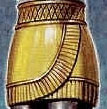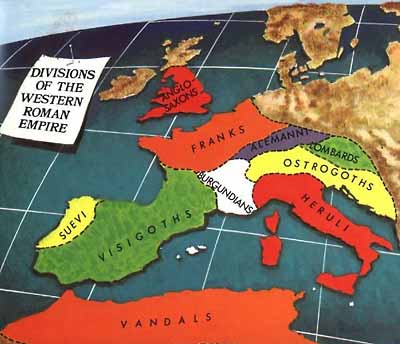King Nebuchadnezzar of Babylon had a series of dreams which troubled his spirit and disturbed his sleep. He commanded all his wisest men: magicians, astrologers, sorcerers and the Chaldeans, to interpret the dreams for him. The Chaldeans spoke first to assure the king, “tell your servants the dream, and we will show the interpretation.” The king answered to the Chaldeans, “The thing is gone from me. If you do not make known to me the dream, with its interpretation, you will be cut into pieces and your houses will be made a dunghill. But if you show the dream, with its interpretation, you will receive gifts and rewards and great honor from me.” The Chaldeans tried to stall, complaining that the king’s request was a rare and difficult one, but they reluctantly admitted to the king “there is not a man upon the earth that can show the king’s matter.” King Nebuchadnezzar became furious and decreed that all the wise men of Babylon be destroyed.
The dream and its meaning was revealed by Yahuwah to the prophet Daniel, so he could approach the king to intervene on behalf of all the wise men.

You saw, O king, and behold, a great image. This image, mighty and of exceeding brightness, stood before you, and its appearance was frightening. The head of this image was of fine gold, its chest and arms of silver, its middle and thighs of bronze, its legs of iron, its feet partly of iron and partly of clay. As you looked, a stone was cut out by no human hand, and it struck the image on its feet of iron and clay, and broke them in pieces. Then the iron, the clay, the bronze, the silver, and the gold, all together were broken in pieces, and became like the chaff of the summer threshing floors; and the wind carried them away, so that not a trace of them could be found. But the stone that struck the image became a great mountain and filled the whole earth.
This was the dream. Now we will tell the king its interpretation. You, O king, the king of kings, to whom the God of heaven has given the kingdom, the power, and the might, and the glory, and into whose hand he has given, wherever they dwell, the children of man, the beasts of the field, and the birds of the heavens, making you rule over them all - you are the head of gold. Another kingdom inferior to you shall arise after you, and yet a third kingdom of bronze, which shall rule over all the earth. And there shall be a fourth kingdom, strong as iron, because iron breaks to pieces and shatters all things. And like iron that crushes, it shall break and crush all these. And as you saw the feet and toes, partly of potter’s clay and partly of iron, it shall be a divided kingdom, but some of the firmness of iron shall be in it, just as you saw iron mixed with the soft clay. And as the toes of the feet were partly iron and partly clay, so the kingdom shall be partly strong and partly brittle. As you saw the iron mixed with soft clay, so they will mix with one another in marriage, but they will not hold together, just as iron does not mix with clay. And in the days of those kings the God of heaven will set up a kingdom that shall never be destroyed, nor shall the kingdom be left to another people. It shall break in pieces all these kingdoms and bring them to an end, and it shall stand forever, just as you saw that a stone was cut from a mountain by no human hand, and that it broke in pieces the iron, the bronze, the clay, the silver, and the gold. A great God has made known to the king what shall be after this. The dream is certain, and its interpretation sure.
The prophecy describes four successive kingdoms, culminating in the destruction of all of them by a stone that was cut from a mountain without human hands. Daniel identified the first kingdom as Babylon, so we don’t need to guess our way through this prophecy.

Gold: Babylon (605 BC)
The fall of Babylon to Medo-Persia occurred on October 29, 539 BC, and is even described in Daniel 5:28: “thy kingdom is divided and given to the Medes and Persians.”
This is the dream which thou sawest, and its interpretation is as follows: The head of gold denotes thee, and the kings of Babylon that have been before thee; but the two hands and arms signify this, that your government shall be dissolved by two kings… [Josephus, Jewish Antiquities Book X]

Silver: Medo-Persia (539 BC)
The prophecy describes this kingdom as an inferior one to Babylon, as silver is inferior to gold. But silver is harder than gold, and the Medo-Persian empire endured over a century longer than Babylon.
Josephus continued his explanation of this prophecy: "…but another king that shall come from the west, armed with brass, shall destroy that government…" [Josephus, Jewish Antiquities Book X]

Bronze: Greece (331 BC)
The kingdom symbolized by the bronze belly and thighs was the Macedonian and Hellenistic empire of Alexander the Great and his successors.
And another government, that shall be like unto iron, shall put an end to the power of the former, and shall have dominion over all the earth, on account of the nature of iron, which is stronger than that of gold, of silver, and of brass. [Josephus, Jewish Antiquities Book X]

Iron: Rome (168 BC to 476 AD)
Rome defeated the Greeks at the Battle of Pydna in 168BC and thus became the dominant world kingdom, strong as iron.
The arms of the Republic Rome, sometimes vanquished in battle; always victorious in war, advanced with rapid steps to the Euphrates, the Danube, the Rhine, and the Ocean; and the images of gold, of silver, or brass that might serve to represent the nations and their kings, were successively broken by the iron monarch of Rome. [Edward Gibbon, History of the Decline and Fall of the Roman Empire, Vol. III]
In the second century, Hippolytus wrote of Rome:
Rejoice, blessed Daniel! thou hast not been in error: all these things have come to pass… Already the iron rules; already it subdues and breaks all in pieces; already it brings all the unwilling into subjection; already we see these things ourselves. [Ante-Nicene Fathers, Vol. 5]

Iron and Clay feet: Divided kingdoms of Europe
When the last Roman emperor, Romulus Augustulus (the Diminutive Augustus), was dethroned in 476 AD, the empire was divided into ten kingdoms. These were the Ostrogoths, Visigoths, Franks, Vandals, Suevi, Alamani, Anglo-Savons, Heruli, Lombards and the Burgundians.

And as you saw the feet and toes, part of potters clay and part of iron, it shall be a divided kingdom, but some of the strength of iron shall be in it, just as you saw iron mixed with the soft clay. And as the toes of the feet were partly iron and partly clay, so the kingdom shall be partly strong and partly brittle. As you saw the iron mixed with soft clay, so they will mix with one another in marriage, but they will not hold together, just as iron does not mix with clay. [Daniel 2:41-43]
This prophecy comes from ancient Babylon and it has accurately foretold the rise and fall of history’s most dominant kingdoms. Furthermore, history shows us centuries of European imperialism, failed attempts to reunite the divided European kingdoms, even alliances made in marriage. If the prophecy holds true, they will not hold together, just as iron does not mix with clay.
And in the days of those kings the God of heaven will set up a kingdom that shall never be destroyed, nor shall the kingdom be left to another people. It shall break in pieces all these kingdoms and bring them to an end, and it shall stand forever, just as you saw that a stone was cut from a mountain by no human hand, and that it broke in pieces the iron, the bronze, the clay, the silver, and the gold. A great God has made known to the king what shall be after this. The dream is certain, and its interpretation sure. [Daniel 2:44,45]
This sets the foundation for the prophecies recorded in Daniel chapter seven in Daniel’s vision of four great beasts.
Daniel did also declare the meaning of the stone to the king but I do not think proper to relate it, since I have only undertaken to describe things past or things present, but not things that are future; yet if any one be so very desirous of knowing truth, as not to wave such points of curiosity, and cannot curb his inclination for understanding the uncertainties of futurity, and whether they will happen or not, let him be diligent in reading the book of Daniel, which he will find among the sacred writings. [Josephus, Jewish Antiquities Book X]